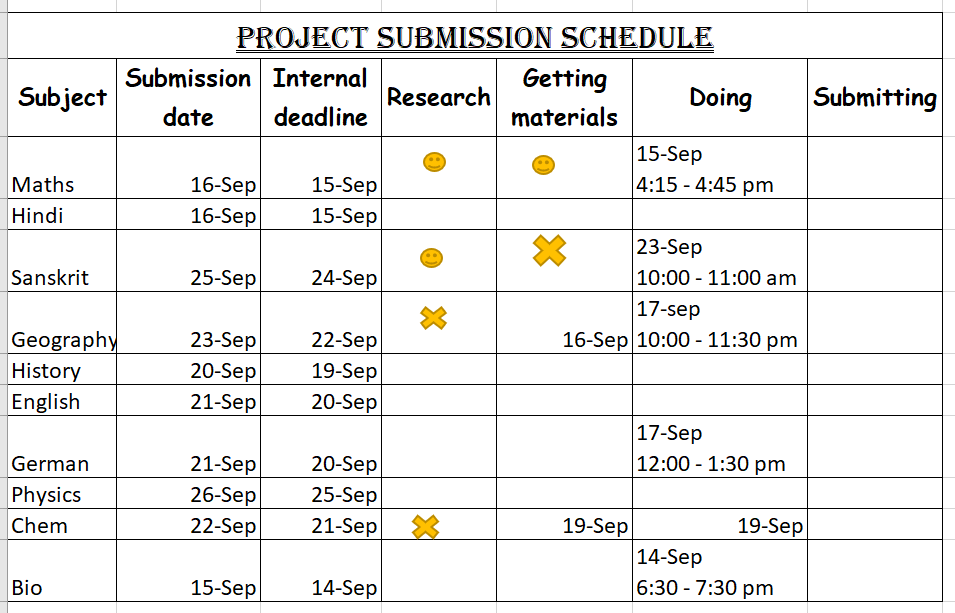
When I look at my daughters, in grades 5 and 10, I feel they are more pressed for time than me. And they could definitely do with some help in managing their time.
Even in the pre covid-19 era, when they went to school and there were no online classes in their lives they always starved for time. And I cannot blame them. After a full day at school they often had stay backs for practices or went in the morning for the same. Every evening they had projects to finish or homework to do. And then when it came to personal engagements, they had their own hobbies to pursue, for which I am afraid I encouraged them relentlessly, birthday parties to attend and spend some good family time too. And above all, play or cycle or walk in the evening with their friends.
Now classes and evening play should be the most important things for any school going child and must not be compromised on. However, in the modern educational system they have so many other things to do, which seem equally, if not more, important.
When I think back to my own school days, I cannot remember a day when I was not playing in the evening because I had other things to do. There were projects but they never took up so much time. May be because they did not have to be of as high quality as my daughter’s!
Anyways, this post is not to discuss what is right or wrong in the current school system. This is a post to discuss how we, as their parents or teachers or guardians or anyone they look up to for guidance, can help them manage their time and still have a childhood left.
Because to be honest, the very idea of a child having to manage their time seems an oxymoron. But it is a reality that we must face and talk about.
During the lockdown, kids’ access to laptops and mobiles meant that their foray into the online world has increased manifold and hence the addiction to it.
Even after regular classes have begun, they seem to spend much more time online than the pre-Coved times. It has become something like elders bring back work from office. Earlier whatever discussions and work had to be done for projects, tests, etc. was possible only in school. Once you are back home, you switch off completely.
Not so anymore. Now whatsapp groups are being created for every school activity so that teachers and students can be in touch and hence on the same page regarding the vent.
I honestly hate seeing my kids interacting with peers on chats. Phone call is fine but their culture of chatting and texting is something I don’t get. Afterall, if you are chatting in real time, it’s better to call them up.
That is at least what I think!!
This is an ongoing struggle between parents and children, and will continue for ages. The issue might be different but the conflict remains.
But I digress. I am here to talk about time management tips for students. Here I outline some of the steps that the students can take themselves or with the help of their elders to manage their time well.
Step 1. Set your goals
Children need to be clear about what they want to do in the short term and long term. The short term is a week at the end of which they usually have their periodic tests or the term at the end of which they have their exams. I make the exams pivot points for my children because they are what we must plan around. In a way it’s good to have a goal post that is fixed. There is no chance of moving them.
If your child is too small to understand what is a goal, do not use the term. Just ask them what they want to do in terms of completing their studies, completing their hobby projects, playing or learning something new.
My 3rd grader loves writing stories so that’s something I use to make understand what a goal is. If she wants to have her story completed by the weekend or the month, that is her goal. And she must do everything to achieve it.
Step 2. Split the task into small steps
This is very essential for the children to do. Otherwise, they will get overwhelmed.
Continuing with the example of a midterm exam, the goal is to finish the syllabus at least 15 days in advance so that there is no last moment panic and studying long hours.
I am a very strong advocate of studying consistently throughout the year and I just hate it if children are slogging it out at the last moment. It just increases their anxiety and makes them prone to commiting mistakes. Now completing the syllabus of 6 to 8 subjects in 5 months can seem daunting but when you break it down into subjects and total number of chapters that need to be finished, it will start looking pretty doable. Oh! I have only 3 chapters in Physics. There are just four stories to be done for English.
Or say, your child is preparing for an online Quiz Contest or online singing competition. it can seem overwhelming to find time to prepare for it but it’s only because you are looking at the final goal. Break it down into small doable steps. Choosing the song can be a good start and a good first step to take. The next step could be practicing 45 minutes everyday or an hour every alternate day.
Help the children in writing down the steps they need to take to accomplish that goal.
Step 3. Prioritise each task over another
Understanding which task is more important than the other one is prioritising, and a skill every child must learn irrespective of their age. Before you roll your eyes at me for saying that even small children should learn it, just think over if you have not yourself used prioritising to get things done your way.
If you want to go out to play, you must finish this glass of milk. And the child realises that playing is more important than throwing tantrums. Prioritisation done, choices made and tasks accomplished. All in a split second and hence we don’t realise the process behind it.
So, rest assured your child already knows prioritisation. Just help them in understanding the concept and deciding the priority for each task or goal they have written down.
Step 4. Draw up a schedule
Scheduling is nothing but putting a time frame for each task that needs to be done. It is important to have this written down and struck to the wall in front of their study desk. I choose the study desk because if that’s the only place I can think of where they sit still for any stretch of time.

The feeling of not having enough time is more psychological than actual. looking at the schedule, children know what they are supposed to do everyday and forget about everything else, which helps them to get rid of the stress of doing so many things. Moreover, children feel comfortable when they are doing something actively. That is the way they are. So, when everything is spelt out clear-cut in doable steps, they are confident of accomplishing it.
Step 5. Stick to the schedule
Yes, you need to stick to the schedule to get anything fruitful out of this whole exercise!
Our mind always works overtime, thinking of past and future things. Children’s minds are even more chaotic because they have so many more things to think about. It is very easy for them to stray and start doing something else that they suddenly feel is more important. It is our job to kindly steer them back on routine and help them stick to the schedule.
We must make them understand that sticking to the schedule would get things done faster than doing one or the other thing randomly.
Once they get into the habit of scheduling, it will bring about a stability in their activities and they would themselves stick to it. Because even children need anchors around which they can build their daily routines. That’s also the reason psychologists emphasize having a schedule around which children can build their day.
Final thoughts
There are just 5 easy steps to managing time for students but there are two things that you must always keep in mind:
Everything can change when you want
Whatever goals you write down or steps you break it into, nothing is written in stone. It can change whenever you feel the need to do so. Say you have set the priority of one task higher over the other but you feel after a couple of days that you have not done it correctly. No sweat, simply go back and change it. Any schedule that you have drawn or goals that you have fixed for yourself is to help you. You can change it so that it keeps helping you in managing your time rather than becoming another unsurmountable thing to do.
Be kind to yourself
Remember that tomorrow is another day and you will get a chance to complete things that you could not finish today. Do not get stressed out because you could not stick to your schedule or accomplish a goal despite writing it down. Can you do it in the next 15 days? Or over the next couple of months? It’s good enough.
Because sometimes we tend to be over ambitious while writing down our goals or drawing a schedule. This experience will teach you to be more practical the next time.
There are some things you must take care of while managing your own time or helping someone else manage their time.
- Create some non negotiable like play time, family time, TV or mobile time. We are talking of kids here and they are entitled to their share of the fun.
- Never ever create a 24 hour schedule. Not more than 4-5 hours of your day should be scheduled. This will give you the much needed time to while away and waste, where you get really creative and often end up doing things you truly love.
- Don’t overthink, just get going. Remember, Mark Twain said, “The Secret to getting ahead is getting started”.
Over to you
I have tried to exhaustively list out how I have helped my kids manage their time so that they can keep doing things they really love.
If you have any questions, drop a comment and I promise to respond.


Trackbacks/Pingbacks